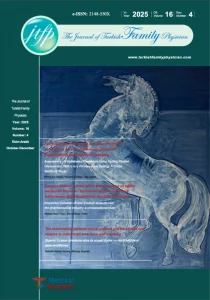The vaccination status and knowledge level of vaccines among adults over the age of sixty- five
Aim: The aim of this study is to investigate vaccination status and knowledge level of vaccination among the elderly.
Methods: A questionnaire (21 questions) was prepared by the study team and applied to elderly patients attending outpatient clinics of two hospitals (one on European, the other on the Asian side) of Istanbul during March, 2011. In total 347 elderly people gave consent to participate. Likert scale of 10 points was used to determine self rated knowledge level of each vaccine. For statistical analysis, firstly descriptive statistics were calculated, and then chi-square test and t test or equivalent was used for comparative analysis.
Results: The percentage of male participants was 47% (163 person). The percentage of participants having Influenza vaccination regularly was 26.8% (93 person). The same percentage for Pneumococcal vaccine 3.1%(11 person) and for tetanus vaccine 11% (38 person). According to self-rated 10 point likert scale 45.2% of the participants were rated their level of knowledge for influenza vaccine as 1 and 3.7% rated as 10. Among the participants approximately 65% rated their knowledge for pneumococcal and tetanus vaccine as 1. Participants having higher education level than primary care know more about the vaccines and also they got vaccine shots more.
Conclusion: Vaccination status and the knowledge level for vaccines were very low among the participants. Relatively influenza vaccine is known better and applied more. As the educational level increases, knowledge and application of vaccines also increases significantly.
Key words: vaccination, elderly, education
References
- Çifçili S. Yaşlanan dünya, yaşlanan Türkiye. “Aile Hekimleri için Yaşlı Sağlığına Bütüncül Yaklaşım” içinde. (ed) Çifçili S. İstanbul, Deomed Yayınevi. 2011;13-20.
- Jokinen C, Heiskanen L, Juvonen H, et al. Incidence of community-acquired pneumonia in the population of four municipalities in Eastern Finland. Am J Epidemiol 1993;137:977-88.
- Sánchez JF, Vicente L, Pacheco N, Martín M, Guijarro P, Barquilla P. Improvement of the anti-flu vaccine coverage in people older than 65 years, but whom do we vaccinate? Med Clin (Barc) 2010;134(15):708-9.
- CDC. Recommended Adult Immunization Schedule, by Vaccine and Age Group. United States 2014. http://www.cdc.gov/vaccines/schedules/hcp/ imz/adult.html adresine 10.08.2014 tarihinde erişilmiştir.
- Humair JP, Buchs CR, Stadler H. Promoting İnfluenza Vaccination of Elderly Patients in Primary Care. Family Practice 2002;19(4):383-9.
- Abramson ZH, Levi O. Is Performance Of İnfluenza Vaccination İn the Elderly Related to Treating Physician›s Self Immunization and Other Physician Characteristics? Preventive Medicine 2008;47(5):550–3.
- Zimmerman RK, Nowalk MP, Bardella IJ, et al. Physician and Practice Factors Related to Influenza Vaccination Among the Elderly. Am J Prev Med 2004;26(1):1-10.
- Bülbül Y, Öztuna F, Gülsoy A, Özlü T. Doğu Karadeniz Bölgesinde Kronik Obstrüktif Akciğer Hastalığı: Hastalık özellikleri ve İnfluenza-Pnömokok aşılama sıklığı. Türkiye Klinikleri 2010;30(1):24-9.
- Thompson MG, Shay DK, Zhou H, et al. Estimates of Deaths Associated with Seasonal Influenza — United States, 1976—2007 , CDC Morbidity and mortality weekly report 2010; 59(33):1057-62.
- Zeybek Y, Tokalak İ, Boyacıoğlu S. Altmış Beş Yaş Ve Üzeri Erişkinlerde Aşılanma Duru. Türk Geriatri Dergisi 2004;7(3):152-4.
- Biberoğlu K, Biberoğlu S, Özbakkaloğlu M ve ark. Haydi büyükler aşıya! http://www.tihud.org.tr/main/content?ref=2&child=179 adresinden 10.11.2014 tarihinde erişilmiştir.
- Moore LG. Escaping the Tyranny of the Urgent by Delivering Planned Care. Fam Pract Manag 2006;13(5):37-40.
- Santibanez TA, Nowalk MP, Zimmerman RK, et al. Knowledge and beliefs about influenza, pneumococcal disease, and immunizations among older people.J Am Geriatr Soc 2002;50(10):1711-6



